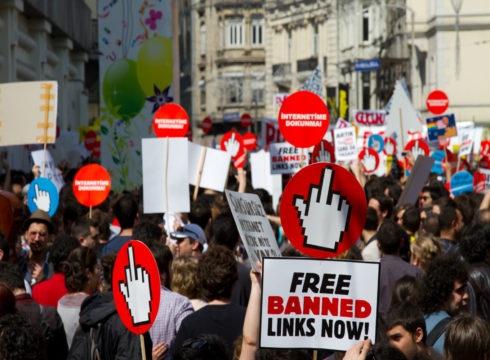SUMMARY
DoT makes amendments in the telecom and internet service provider (ISP) permits to incorporate Net Neutrality Rules
Last month, the Telecom Commission accepted the November 2017 recommendations of the TRAI on Net Neutrality
Internet access services need to be governed by a principle that restricts any form of discrimination, restriction or interference in the treatment of content, says DoT
Inc42 Daily Brief
Stay Ahead With Daily News & Analysis on India’s Tech & Startup Economy
The department of telecommunications (DoT) has made amendments in the telecom and internet service provider (ISP) permits to incorporate Net Neutrality Rules from barring and blocking or slowing down of content, according to its notification issued on Monday.
The Telecom Commission, the highest decision-making body, last month accepted the November 2017 recommendations of the Telecom Regulatory Authority of India (TRAI) emphasising an open Internet. Based on the recommendations, the government has made amendments in the ISP permits to incorporate rules on net neutrality.
It has directed all licensees (UL, VNO license, UASL and CMTS) providing Internet access service to refrain from engaging in any discrimination, restriction or interference in the treatment of content.
The DoT, while ensuring government’s commitment to the fundamental principles of net neutrality in view of keeping internet accessible and available to all without discrimination, said, “Internet access services, need to be governed by a principle that restricts any form of discrimination, restriction or interference in the treatment of content, including practices like blocking, degrading, slowing down or granting preferential speeds or treatment to any content.”
ISPs often discriminate content by simply not treating the data on the Internet equally –for instance, which app you can use, which sites will stream video faster, so on and so forth –thus limiting users’ experience of the world wide web.
“Increasing concerns have been raised globally as well as in India relating to the potential for discriminatory treatment of internet traffic by entities that control internet access,” the notification said.
It has allowed fast lanes for critical specialised services and also kept content delivery networks outside the ambit of these open internet rules.
Background Of Net Neutrality
There have been multiple consultation on the issue of net neutrality and related aspects. Both TRAI and DoT have taken necessary steps.
- January 2015: DoT formed a Committee on Net Neutrality
- May 2015: The Committee submitted its recommendation
- March 2015: TRAI issued a consultation paper on ‘Regulatory Framework for Over-The-Top (OTT) services
- Dec 2015: TRAI issued a consultation Paper on ‘Differential Pricing of Data Services’.
- February 2016: TRAI issued the ‘Prohibition of Discriminatory Tarrifs for Data Services Regulation’
- November 2017: TRAI provided to DoT its recommendations on Net Neutrality
A Run-Down Of The ISP Amendments By DoT
- A Licensee providing Internet access service shall not engage in any discriminatory treatment of content, including based on the sender or receiver, the protocols being used or the user equipment.
- The Licensee is prohibited from entering into any arrangement, agreement or contract, by whatever name called, with any person, that has the effect of discriminatory treatment of content.
- “Content” shall include all content, applications, services and any other data, including its end-point information, which can be accessed or transmitted over the Internet.
The DoT further said to establish a multistakeholder body with an advisory role. It would seek TRAI’s recommendations on its composition, functions, role and responsibilities. Monitoring and enforcement of net neutrality rules would remain with DoT.
Internet is a catalyst in the process of imparting, receiving, and sending information in a democratic nation. It is also an enabler of socio-economic and cultural rights. However, India is often surrounded by reports of “Internet shutdown”. The United Nation terms “internet shutdown” as a human rights violation.
Between January 2012 and May 1, 2018, India experienced 174 Internet shutdowns for various reasons and duration across 19 states in the country.
In future, TRAI and DoT may as well look into the issue pertaining to the rise of “Internet shutdowns” in the country to actually enable Internet Freedom.
Note: We at Inc42 take our ethics very seriously. More information about it can be found here.


